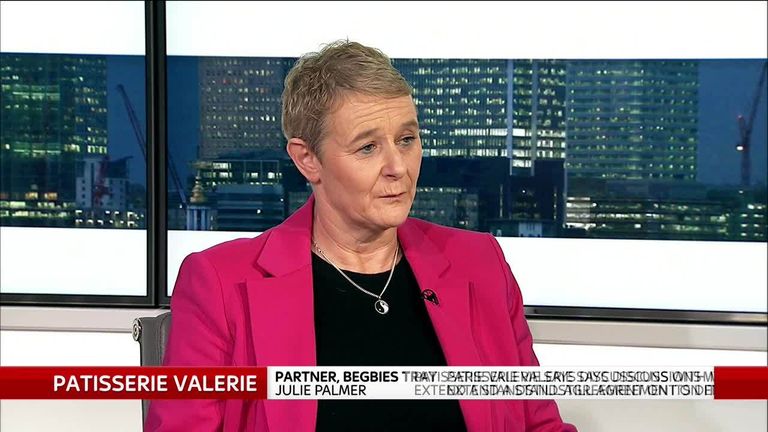Patisserie Valerie saga likely to rumble on for years
Questions remain for regulators and auditors that gave the chain a clean bill of health months before accounts problems surfaced.
Wednesday 23 January 2019 21:22, UK
The administration of Patisserie Valerie means that shareholders in the collapsed cake maker have lost everything - while 920 of the group's 3,000 or so employees have already lost their jobs.
Yet there will be winners from this corporate catastrophe.
Lawyers and other professional advisers can expect a bonanza as regulators sift through the wreckage and the administrator tries to sell what remains of the business as an ongoing concern.
This saga is likely to rumble on for years.
Chris Marsh, the former chief financial officer, has been arrested and released on bail while the Serious Fraud Office has launched a criminal investigation into an as yet unnamed individual.
The Financial Reporting Council, the regulator for the accountancy profession, is also carrying out an investigation of its own into Grant Thornton's auditing of Patisserie Valerie's accounts.
Yet the FRC is itself facing questions after The Times newspaper discovered that the regulator had approved the quality of an audit of Patisserie Valerie's books six months before the company admitted to uncovering problems with its accounts.
Others also facing questions include HSBC and Barclays, the banks to Patisserie Valerie, after the discovery of two overdrafts whose existence had not previously been disclosed to the company's board.
Some shareholders are thought to be investigating the possibility of legal action.
While corporate collapses are nothing new, this one has been shocking.
As Julie Palmer, of the business recovery group Begbies Traynor, pointed out to Sky News today, there are usually 'red flags' which appear before a company fails, for example with the collapse of Carillion last year.
The failure of Patisserie Valerie, though, came out of nowhere. There had been no red flags raised about the company.
In May last year, the company reported a 9% rise in the six months to the end of March, declaring that it had £28.8m of net cash.
It was only in October that the company revealed that, rather than having net cash, it had overdrafts of £9.7m.
As shocking, is that it ought to have been fairly straightforward to establish the position.
Chris Boxall of Fundamental Asset management, a shareholder in Patisserie Valerie, pointed out to Sky News this week that the cakemaker was a simple-to-understand business whose trading ought to have been easy to track.
The discrepancy between the supposed net cash position and the actual situation ought also to have been picked up.
Cash is the most easily verifiable item on a company's balance sheet - while the most basic thing an auditor does should be to check the cash balances of their client with its bank.
Financial controls in the company, however, appear to have been so lax that the discrepancy only came to light when Patisserie Valerie was served by HM Revenue & Customs with a winding-up order over an unpaid tax bill of £1.18m.
One big question will be how these secret overdrafts were built up.
An investigation by accountants PWC for Patisserie Valerie is already said to have established that funds were being moved between current accounts paid in at bank branches, with the intention of flattering the company's cash position at the end of the financial year.
Those cheques later bounced - something that, arguably, the banks ought to have flagged with the company's auditors.
Add to that the fact that forensic accountants have uncovered what they have said is thousands of false entries in the company's ledgers and it begins to look as if this was a complicated and elaborate fraud.
The scale and nature of this activity is such that those who have been following the saga closely suspect more than one person will ultimately turn out to have been involved in any wrongdoing.
In the meantime KPMG, the administrator, is trying to find a buyer.
Ms Palmer believes there will be interest because the business that emerges from the administration process will be healthier with the 91 less profitable outlets having already been closed.
Patisserie Valerie was a popular, aspirational brand before everything went wrong.
A partnership with Sainsbury's had seen it operating concessions in a number of the supermarket's stores.
Another partnership, with Barclays, entitled the bank's wealthier Premier account holders to free coffee in its branches.
And it was popular with councils up and down the land for rejuvenating town centres and increasing footfall.
One of those buyers may turn out to be Luke Johnson, Patisserie Valerie's chairman and largest shareholder, who has been the biggest individual loser from the collapse.
Mr Johnson, whose fund took the business from a handful of outlets to more than 200, has behaved honourably since the accounting problems were uncovered.
He lent the company £20m in October to give it breathing space and extended that loan earlier this week by another £3m, to pay the staff's wages for January and to enable Patisserie Valerie to keep trading through the administration process.
That loan is both unsecured and interest-free.
It's a sign that Mr Johnson still believes in the business.
The remaining staff will hope that, after all these mishaps, so do the customers.






